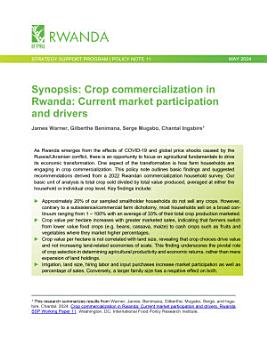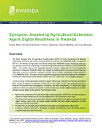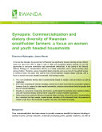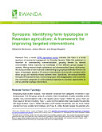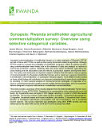Synopsis: Crop commercialization in Rwanda: Current market participation and drivers
Warner, James · Benimana, Gilberthe Uwera · Mugabo, Serge · Ingabire, Chantal
Apr 2025 · Rwanda SSP Policy Note Book 11 · Intl Food Policy Res Inst
Ebook
6
Pages
family_home
Eligible
info
reportRatings and reviews aren’t verified Learn More
About this ebook
As Rwanda emerges from the effects of COVID-19 and global price shocks caused by the Russia/Ukrainian conflict, there is an opportunity to focus on agricultural fundamentals to drive its economic transformation. One aspect of the transformation is how farm households are engaging in crop commercialization. This policy note outlines basic findings and suggested recommendations derived from a 2022 Rwandan commercialization household survey. Our basic unit of analysis is total crop sold divided by total value produced, averaged at either the household or individual crop level. Key findings include: Approximately 20% of our sampled smallholder households do not sell any crops. However, contrary to a subsistence/commercial farm dichotomy, most households sell on a broad continuum ranging from 1 – 100% with an average of 33% of their total crop production marketed. Crop value per hectare increases with greater marketed sales, indicating that farmers switch from lower value food crops (e.g. beans, cassava, maize) to cash crops such as fruits and vegetables where they market higher percentages. Crop value per hectare is not correlated with land size, revealing that crop choices drive value and not increasing land-related economies of scale. This finding underscores the pivotal role of crop selection in determining agricultural productivity and economic returns, rather than mere expansion of land holdings. Irrigation, land size, hiring labor and input purchases increase market participation as well as percentage of sales. Conversely, a larger family size has a negative effect on both.
Rate this ebook
Tell us what you think.
Reading information
Smartphones and tablets
Install the Google Play Books app for Android and iPad/iPhone. It syncs automatically with your account and allows you to read online or offline wherever you are.
Laptops and computers
You can listen to audiobooks purchased on Google Play using your computer's web browser.
eReaders and other devices
To read on e-ink devices like Kobo eReaders, you'll need to download a file and transfer it to your device. Follow the detailed Help Center instructions to transfer the files to supported eReaders.
